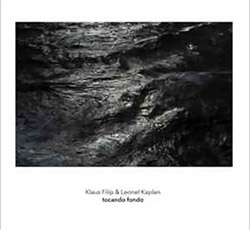
Two slowly unfolding improvisations from trumpeter Leonel Kaplan using extended and unconventional techniques, and electronic artist Klaus Filip performing on sine waves, in a two part extended piece recorded in Buenos Aires after the two met in live performance.
Out of Stock
Quantity in Basket: None
Log In to use our Wish List
Shipping Weight: 3.00 units
Sample The Album:
Klaus Filip-sinewaves
Leonel Kaplan-trumpet
Click an artist name above to see in-stock items for that artist.
Label: Another Timbre
Catalog ID: at90
Squidco Product Code: 21491
Format: CD
Condition: New
Released: 2015
Country: UK
Packaging: Cardboard Gatefold
Recorded in Buenos Aires, in January 2014.
Interview with Leonel Kaplan & Klaus Filip
Seeing as you live in different continents, it's rather surprising that you have developed a duo project. How did it come about?
Leonel: It is not that surprising (at least to me) as all my musical partners up to now are living overseas. It's not something I choose, but it has happened from the very beginning.
Klaus: I was visiting Leonel in Buenos Aires, we played together in a small club and we talked a lot. The recording for this CD happened afterwards during a very hot night in Leonel's house.
Are the pieces entirely improvised, or did you have any sort of plan going into the recordings?
Keonel They are improvised. We didn't talk about anything music related before playing, though yes, in post-production we discussed a lot. We played two long pieces, and because of the timing limitations on a CD, and, I think, the inner complexity of the music we played, we had to cut out almost half the music. For me, improvisation is just a tool to make things happen. Like a painter choosing between oil or acrylics. Post-production is where compositional ideas came into play. It was a process of listening and refining until the pieces revealed themselves. Sometimes you take things out because you don't like them, and sometimes you take them out because they don't fit with where the piece is going, even if you like the music. So, somehow, you start thinking and talking about form. The original improvisation is like a rough stone, and we started sculpting it.
We worked on this music for a full year. Klaus's playing is so extremely complex that you can't work on it for long before starting to hear things that doesn't exist. It's like a mirage, and you need lots of rests, and to start again with fresh ears after any change you make to the music.
Why the title 'tocando fondo'?
Klaus: The title is inspired by the cover artwork by Margarita García Faure and by the poetry of the Spanish language. Our music is floating but also extreme, haptic and concrete.
What is your musical background, and how did you get into improvised music?
Leonel: I came from jazz, then free jazz and the whole avant-garde movement. This was the music I learned, and is mostly the music I still listen to. I probably got into non-idiomatic improvisation thanks to the Argentinian economic crisis. My parents and sisters moved to Spain in 2000 and, though I stayed in Buenos Aires, I started traveling to Europe a lot, where I met musicians like Wade Mathews, Michel Doneda, Lê Quan Ninh and Axel Dörner. It was the right moment. Something was in the air and I jumped in quickly and naturally. I was searching for something, and discovered that there were many other people out there looking for the same thing. I felt comfortable with these ideas. So in a way I was lucky in my misfortune.
Klaus, how did you come to focus exclusively on sinewaves as your instrument?
Klaus: Since playing with the computer, I had to find a way to use it as a musical instrument. First I was playing a lot with samples and edited speech, but I wanted to perform music that is focused on itself - abstract. Also I needed a possibility to play/improvise together with other musicians in a musical way. Around 2000 I came across programming on sinewaves still with the aim of generating speech (additive synthesis). It was during this work that I started to become fascinated and attracted by the sound and mutual reaction of just a few of these simple tones.
Leonel, I imagine that the experimental/improv music scene in Argentina - and Latin America generally - is pretty small, certainly as compared to, say, Berlin or London. Can you tell us about what is going on? Are there things we in Europe should know about but don't?
Leonel: The experimental scene in Buenos Aires is pretty big, though somehow conservative in a way, which is something I still don't understand. 'Conservative' meaning that they are mostly attached to old ideas. But of course you find major exceptions like Alan Courtis, to name just one. But if you go deeper into free improv, or even deeper into non-idiomatic improvisation, then it's quite difficult to find a real scene. We were always very minimal in numbers. But then again, this small scene has come up with some great musicians like Lucio Capece, Diego Chamy, Gabriel Paiuk, and Sergio Merce. Most of them have been living in Europe for a long time now, and it's hard to find a new generation of musicians interested in what we started here fifteen years ago.
Klaus, what was your impression of the Latin American scene as you were travelling through? How does it compare with the current state of affairs in Vienna? Are there advantages to being a small scene?
Klaus: I only met very few musicians in Latin America, so there is no way I can talk about its scene. Those I met were very dedicated and focused on their personal approach, like Sergio Merce, Eden Carrasco, Fil Uno, Luis Toto Alvarez and Rolando Hernandez. In Vienna the scene is very diverse, or I would even say there are different separated scenes that all do improvised music. There are not too many people in Vienna that I play with. I need to travel to find my collaborations.
Funding for experimental music these days is pretty scarce anywhere. I assume that you both have to make your living outside of music. What do you do, and do you think it affects your musical practice in any way?
Leonel: I'm a trumpet teacher, but I teach in my studio not in a school, which I really like. That's the way I make my living. I love teaching and I love playing the trumpet. Teaching gives me plenty of freedom to play the music I want to play without making any compromise with the establishment for funding, and it also makes me play and think about my instrument every day. I play the trumpet for four hours every day, so when I play my music, I'm in a good shape physically, which is essential for the trumpet. There's another aspect to this situation: I don't play live very often nowadays (maybe once a month or once every two months). This is because I live far away from my musical partners, and because I teach a lot, and also because I don't feel like playing with everybody just for the sake of improvisation. Lately my music has been happening a lot in my unconscious, and I trust that. Every time I play, something new, something very precise and mature comes up. It's wonderful. This is my unconscious that has been working away while I was playing scales or listening to Albert Ayler's music.
Klaus: I teach sound art at a university, which is only a tiny job. And I do other jobs like programming for theatre productions, or for the bicycle shop of a friend of mine. Also I used to curate a festival in Austria. So no, I don't make my living from music, but this also keeps my musical approach independent from commercial pressures. On the other hand all these things I do apart from actually playing music take a lot of time. I would prefer to play live much more frequently - one of the main reasons why I like touring.

The Squid's Ear!
Artist Biographies
"Klaus Filip *1963 computer music, programming, composition. Klaus Filip is a performer/composer/programmer and is maybe the first viennese musician, who used the laptop on stage at around 1993. Study of Musicology and Elektroacoustics (ELAK) at Wofgang Musil at the Universität für Musik und darstellende Kunst Wien. The main focus of his current work is sinewaves, whose subtle and adducent sounds are used in a wide dynamic range. As a sound artist he searches to cross sound and light. Klaus Filip runs a software project called ppooll (formerly known as lloopp) that is a networking collection of a variety of modules. This freeware is widely used by improvising musicians all over the world. Teaching position at the university of applied arts, vienna. Steady dispute with the computer as a musical instrument.
Colaborations with: Radu Malfatti, Kai Fagaschinski, Werner Dafeldecker, Dieb13, Christof Kurzmann, Boris Hauf, Christian Fennesz, Jason Kahn, John Butcher, Sabine Marte, Gilles Aubry, Noid, Mattin, Red White, Cynthia Schwertsik, Cordula Bösze, Silvia Fässler, Taku Unami, Oblaat, Taku Sugimoto, Toshimaru Nakamura, Tim Blechmann, Ivan Palacky, Burkhard Stangl, Eddie Prevost, John Tilbury, Ko Ichikawa, Nikos Veliotis, Axel Dörner, Masahiko Okura, Susanna Gartmayer, Jean-Luc Guionnet, Seijiro Murayama, Katharina Klement, Philipp Leitner, Thomas Strehl, Seymour Wright, Posset, Agnes Hvizdalek, Dafne Vicente-Sandoval, Leonel Kaplan, Sergio Merce U.A."
-Klaus Filip Website (http://filipino.klingt.org/cvkf.html)4/7/2025
Have a better biography or biography source? Please Contact Us so that we can update this biography.
Track Listing:
1. I 27:47
2. II 22:49
Improvised Music
Electro-Acoustic
Electro-Acoustic Improv
Duo Recordings
Electronic Forms
Recordings featuring brass instruments - trumpets, trombones, tubas, other horns
Search for other titles on the label:
Another Timbre.

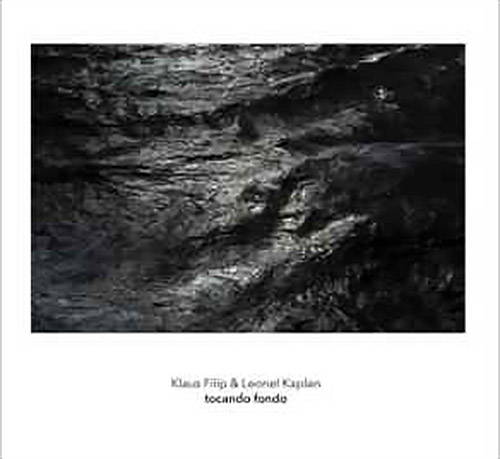

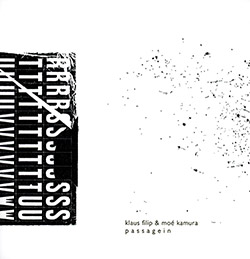
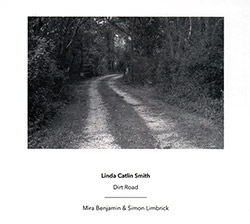
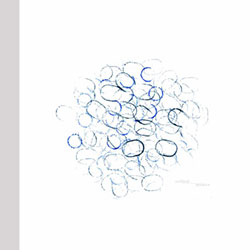

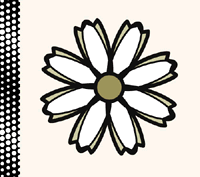


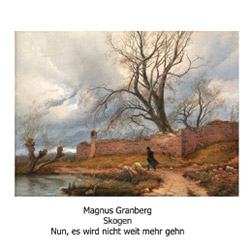




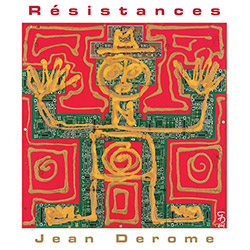



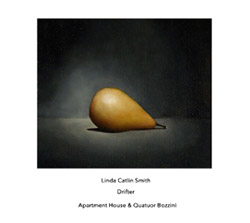

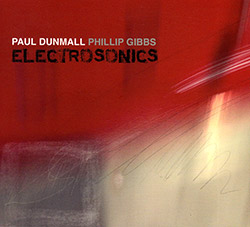

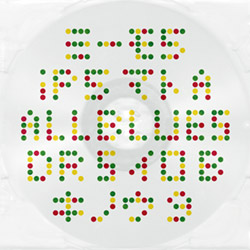

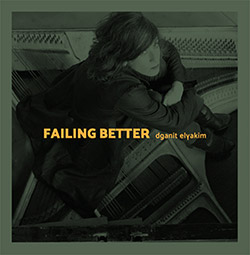
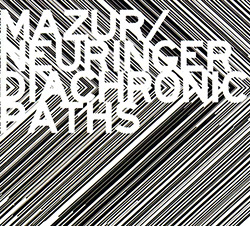



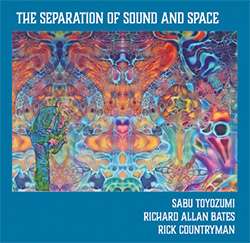
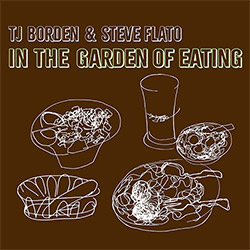

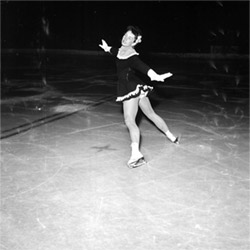

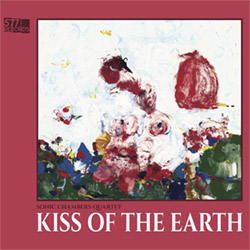

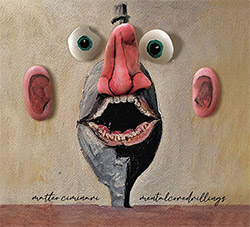
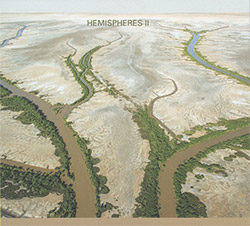
![Niblock, Phill / Anna Clementi / Thomas Stern: Zound Delta 2 [VINYL]](https://www.teuthida.com/productImages/misc4/34623.jpg)
![Yoko, Ono / The Great Learning Orchestra: Selected Recordings From Grapefruit [2 CDs]](https://www.teuthida.com/productImages/misc4/35841.jpg)

![Brotzmann, Peter / John Edwards / Steve Noble / Jason Adasiewicz: The Quartet [2 CDs]](https://www.teuthida.com/productImages/misc4/35975.jpg)
![Brotzmann, Peter / John Edwards / Steve Noble / Jason Adasiewicz: The Quartet [VINYL 2 LPs]](https://www.teuthida.com/productImages/misc4/35976.jpg)
![Thomas, Pat: The Solar Model of Ibn-Al Shatir [VINYL]](https://www.teuthida.com/productImages/misc4/36044.jpg)
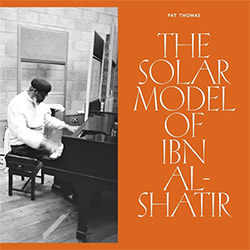



![Rodrigues, Ernesto / Nuno Torres / Guilherme Rodrigues: Whispers In The Moonlight - In Seven Movements [2CDs]](https://www.teuthida.com/productImages/misc4/35765.jpg)



![Cocks, Laura: FATHM [VINYL]](https://www.teuthida.com/productImages/misc4/36055.jpg)













![Schindler, Udo / Sandy Ewen / Damon Smith: Munich Sound Studies Vols. 4, 5 & 6 [3 CDs]](https://www.teuthida.com/productImages/misc4/35966.jpg)
![Turbulence Orchestra & Sub-Units: Smear Out the Difficulties (Double Live) [2 CDs]](https://www.teuthida.com/productImages/misc4/36048.jpg)


![Perelman, Ivo / Tyshawn Sorey: Paralell Aesthetics [2 CDs]](https://www.teuthida.com/productImages/misc4/35871.jpg)

![Myers, David Lee : Tin Drop Tear [BOOK w/ DOWNLOAD]](https://www.teuthida.com/productImages/misc4/36030.jpg)

![Ackerley / Prymek / Turner: All Hope With Sleeping Minds [CASSETTE]](https://www.teuthida.com/productImages/misc4/35950.jpg)








![Olencki, Weston : Pearls Ground Down To Powder [VINYL]](https://www.teuthida.com/productImages/misc4/35956.jpg)
![Myers, David Lee: Oculus [2CDs]](https://www.teuthida.com/productImages/misc4/35857.jpg)


![dustsceawung: dustsceawung [CASSETTE w/ Download]](https://www.teuthida.com/productImages/misc4/35753.jpg)




![Halls of the Machine: Atmospheres For Lovers And Sleepers [CASSETTE w/ DOWNLOAD]](https://www.teuthida.com/productImages/misc4/35806.jpg)



![AHC (Alexander Cooper): Lase [2 CDs]](https://www.teuthida.com/productImages/misc4/35754.jpg)











![Zorn, John / JACK Quartet: The Complete String Quartets [2 CDs]](https://www.teuthida.com/productImages/misc4/35609.jpg)

![Lonsdale, Eden: Dawnings [2 CDs]](https://www.teuthida.com/productImages/misc4/35480.jpg)







![Sanna, Claudio: Compositori Sardi Contemporanei II [2 CDs]](https://www.teuthida.com/productImages/misc4/35317.jpg)







![Zurria, Manuel: Fame di Vento [3 CDs]](https://www.teuthida.com/productImages/misc4/35167.jpg)


![Electric Bird Noise / Derek Roddy: 8-10-22 [CD EP]](https://www.teuthida.com/productImages/misc4/35970.jpg)








![Elephant9 : Mythical River [VINYL]](https://www.teuthida.com/productImages/misc4/34624.jpg)



![Elephant9 with Terje Rypdal: Catching Fire [VINYL 2 LPs]](https://www.teuthida.com/productImages/misc4/35355.jpg)
![Deerlady (Obomsawin, Mali / Magdalena Abrego): Greatest Hits [VINYL]](https://www.teuthida.com/productImages/misc4/34876.jpg)







![Surplus 1980: Illusion of Consistency [CD]](https://www.teuthida.com/productImages/misc4/35069.jpg)
![Staiano, Moe: Away Towards the Light [VINYL + DOWNLOAD]](https://www.teuthida.com/productImages/misc4/35037.jpg)



![Caveira (Gomes / Sousa / Abras / Ferrandini): Ficar Vivo [VINYL]](https://www.teuthida.com/productImages/misc4/34643.jpg)
![Coley, Byron: Dating Tips for Touring Bands [VINYL]](https://www.teuthida.com/productImages/misc4/17906.jpg)

![Lost Kisses: My Life is Sad & Funny [DVD]](https://www.teuthida.com/productImages/misc4/lostKissesDVD.jpg)